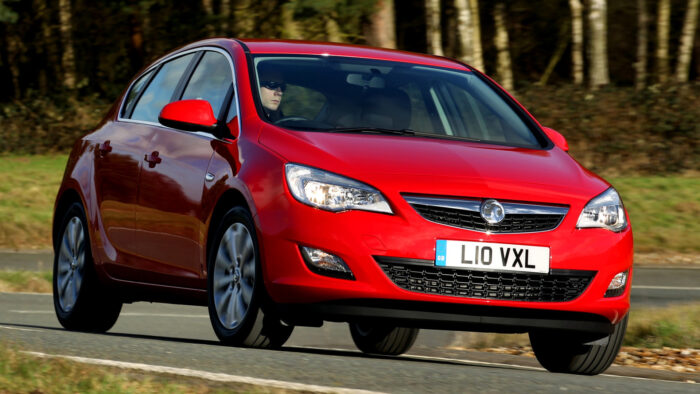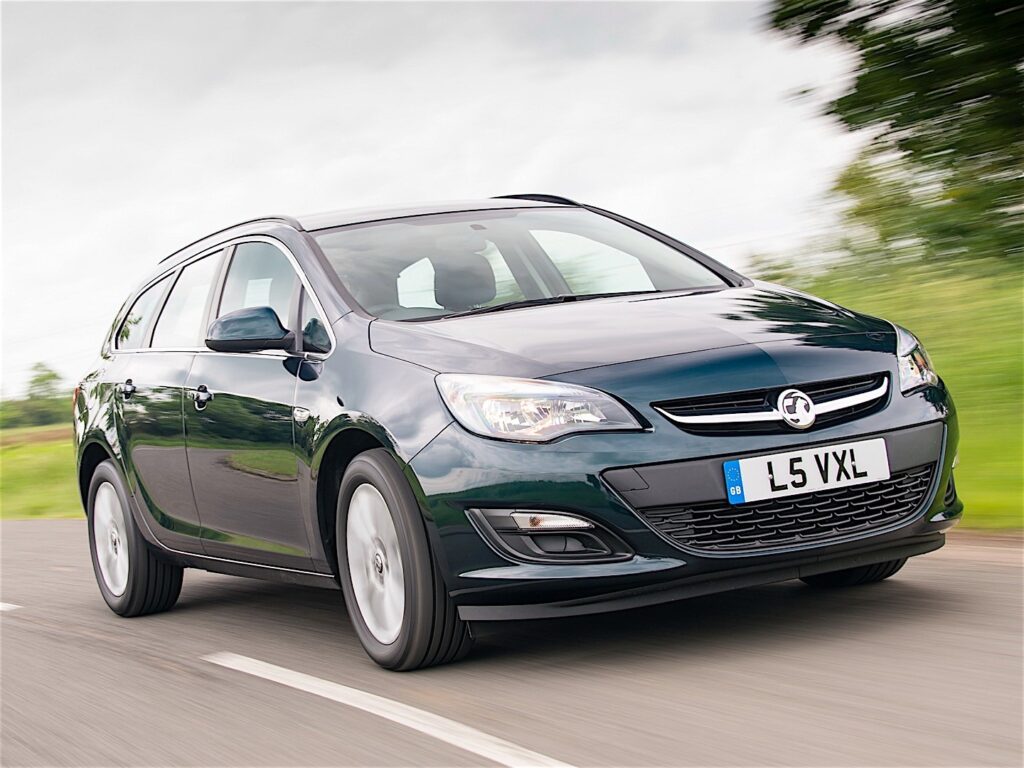Ah, the Vauxhall Astra, a gem in the automotive industry! This quintessential British automobile has evolved over the years, each generation bringing its own flair and set of unique features. If you own one, are considering buying one, or are just curious about this famous car, you’ve landed at the right spot!
Vauxhall Astra: Generations & Trims
| Generation | Year | Popular Trims |
|---|---|---|
| First | 1979 – 1984 | Base, L, GL |
| Second | 1984 – 1991 | Merit, L, LX |
| Third | 1991 – 1998 | Expression, LS, CD |
| Fourth | 1998 – 2004 | Club, SXi, SRi |
| Fifth | 2004 – 2009 | Life, SXi, Design, Elite |
| Sixth | 2009 – 2015 | Exclusiv, Tech Line, GTC |
| Seventh | 2015 – 2021 | Design, Tech Line, SRi, Elite |
Vauxhall Astra: Engine Options Over the Years
| Generation | Petrol Engines | Diesel Engines |
|---|---|---|
| First | 1.2L, 1.4L | N/A |
| Second | 1.4L, 1.6L, 1.8L | 1.7L |
| Third | 1.4L, 1.6L, 2.0L | 1.7L, 2.0L |
| Fourth | 1.6L, 1.8L, 2.2L | 1.7L, 2.0L |
| Fifth | 1.4L, 1.8L, 2.0L | 1.3L, 1.9L, 2.0L |
| Sixth | 1.4L Turbo, 1.6L | 1.3L, 1.7L, 2.0L |
| Seventh | 1.0L Turbo, 1.4L, 1.6L | 1.6L, 2.0L |
Why Is Tire Pressure So Important?
Before we get into the specifics for the Vauxhall Astra, it’s crucial to know why maintaining the right tire pressure matters:
- Safety: Properly inflated tires provide the best possible grip on the road, minimizing skidding or losing control.
- Performance: The correct tire pressure improves the car’s handling and braking.
- Fuel Efficiency: Under-inflated tires can decrease your car’s fuel efficiency by up to 3%.
- Tire Lifespan: Right pressure ensures even tire wear, prolonging their lifespan.

Recommended Tire Pressure: Breakdown by Trims
- First & Second Generation
- Base/Merit: 32 PSI (front), 30 PSI (rear)
- L: 33 PSI (front), 31 PSI (rear)
- GL/LX: 34 PSI (front), 32 PSI (rear)
- Third & Fourth Generation
- Expression/Club: 32 PSI (front), 30 PSI (rear)
- LS/SXi: 33 PSI (front), 31 PSI (rear)
- CD/SRi: 34 PSI (front), 32 PSI (rear)
- Fifth, Sixth & Seventh Generation
- Life/Exclusiv/Design: 32 PSI (front), 30 PSI (rear)
- SXi/Tech Line: 33 PSI (front), 31 PSI (rear)
- Elite: 34 PSI (front), 32 PSI (rear)
- GTC: 34 PSI (front), 32 PSI (rear)
Always check the tire sidewall or the vehicle’s manual for the specific tire pressure recommended by the manufacturer.
Vauxhall Astra Tire Pressure Guide
| Year | Summer Tires (psi) | Winter Tires (psi) |
|---|---|---|
| 1995 | 33 | 34 |
| 1996 | 33 | 35 |
| 1997 | 33 | 35 |
| 1998 | 33 | 35 |
| 1999 | 34 | 36 |
| 2000 | 34 | 36 |
| 2001 | 34 | 36 |
| 2002 | 34 | 36 |
| 2003 | 35 | 37 |
| 2004 | 35 | 37 |
| 2005 | 35 | 37 |
| 2006 | 35 | 37 |
| 2007 | 36 | 38 |
| 2008 | 36 | 38 |
| 2009 | 36 | 38 |
| 2010 | 36 | 38 |
| 2011 | 37 | 39 |
| 2012 | 37 | 39 |
| 2013 | 37 | 39 |
| 2014 | 37 | 39 |
| 2015 | 38 | 40 |
| 2016 | 38 | 40 |
| 2017 | 38 | 40 |
| 2018 | 38 | 40 |
| 2019 | 39 | 41 |
| 2020 | 39 | 41 |
| 2021 | 39 | 41 |
| 2022 | 40 | 42 |
| 2023 | 40 | 42 |
How to Reset Low Tire Pressure Light
- Start Your Engine: Turn the ignition to the “ON” position without starting the engine.
- Locate the TPMS Reset Button: This is often found beneath the steering wheel.
- Press & Hold: Hold the reset button until the tire pressure light blinks three times, then release.
- Wait: After a few moments, the light should turn off. This indicates that the tire pressure system has been reset.
- Check All Tires: Ensure that all tires are inflated to the recommended PSI.
- Drive the Vehicle: Sometimes, you might need to drive for a few minutes to reset completely.
Always ensure you’re maintaining the right tire pressure to optimize fuel efficiency, ensure safe driving, and prolong the life of your tires!
Additional Tire Care Tips for Your Vauxhall Astra
- Regularly Check the Pressure: Tire pressures can change due to fluctuations in temperature. It’s a good idea to check them at least once a month.
- Rotate Your Tires: Ensure even wear by rotating your tires every 6,000 to 8,000 miles.
- Inspect for Damage: Check your tires for signs of damage, punctures, or embedded objects that might lead to slow leaks.
- Align Your Wheels: If you notice uneven wear on your tires, it might be time to get your wheels aligned.
- Avoid Overloading: Always adhere to your vehicle’s load capacity to avoid putting undue strain on the tires.
Conclusion
Your Vauxhall Astra is a marvel of automotive engineering, and by ensuring it stands on the right pressure, you keep it running at its prime. Remember, correct tire pressure is more than just a number; it’s about safety, efficiency, and performance.
As you take to the roads, ensure your journey is not just about the destination but also about the delightful and safe driving experience. Keep your Vauxhall Astra’s tires in top-notch condition and enjoy every mile with confidence.
If you have more insights or personal experiences with maintaining your Astra’s tires, do share in the comments below. The community thrives when we share knowledge. Drive safe, and keep the adventure going!
FAQs
Navigating the world of tire maintenance, especially for a vehicle as renowned as the Vauxhall Astra, can bring up a myriad of questions. We’ve compiled a list of frequently asked questions to help Vauxhall Astra owners and enthusiasts find the answers they need quickly.
1. Why is maintaining the correct tire pressure so important?
Answer: Maintaining the right tire pressure is essential for several reasons:
- Safety: Proper inflation ensures good traction and reduces the risk of tire blowouts and accidents.
- Fuel Efficiency: Correct tire pressure can enhance fuel efficiency, saving you money at the pump.
- Tire Longevity: Regularly checking and maintaining your tire’s pressure can reduce wear and tear, resulting in a longer lifespan for your tires.
- Smooth Driving: Properly inflated tires offer a smoother, more comfortable drive.
2. How often should I check my Vauxhall Astra’s tire pressure?
Answer: Ideally, you should check your tire pressure at least once a month and before long journeys. Remember that tire pressure can fluctuate with temperature changes, so it’s a good idea to check during seasonal shifts as well.
3. Can I use the same tire pressure for both summer and winter tires?
Answer: No, typically, winter tires might require a slightly higher pressure than summer tires. This is due to the softer compound used in winter tires which helps maintain traction in colder conditions. Always refer to the manufacturer’s specifications for precise values.
4. Where can I find the recommended tire pressure for my specific Vauxhall Astra model year?
Answer: The recommended tire pressure for your specific model year can be found in the vehicle’s owner manual. Additionally, many cars have a sticker on the driver’s side door jamb that lists the optimal tire pressures.
5. What happens if my tires are under-inflated?
Answer: Under-inflated tires can cause several issues:
- Increased tire wear
- Reduced fuel efficiency
- Poor handling and reduced stability
- Overheating, which can lead to tire failure
6. What about over-inflated tires?
Answer: Over-inflated tires can be equally problematic:
- They make the tire stiff and rigid, reducing traction.
- They are more susceptible to damage from potholes or debris.
- The ride might feel more bumpy and uncomfortable.
- Uneven and accelerated tire wear, especially in the center tread area.
7. Can I use a regular air pump to inflate my Vauxhall Astra’s tires?
Answer: Yes, you can use a regular air pump. However, it’s crucial to use a reliable tire pressure gauge to ensure you’re inflating the tires to the correct pressure.
8. How do external temperatures affect my tire pressure?
Answer: Tires tend to lose or gain 1 PSI for every 10°F change in temperature. During colder months, you might find your tire pressure decreases, whereas in hotter months, it might increase.
9. How does tire pressure affect fuel efficiency?
Answer: Under-inflated tires have increased rolling resistance, meaning the engine must work harder, consuming more fuel. It’s estimated that for every 1 PSI drop in all four tires, fuel efficiency can reduce by up to 0.3%.
10. Do I need to replace my tire valve caps if they’re lost or damaged?
Answer: Yes, it’s a good practice to do so. Valve caps protect the valve from dust, debris, and moisture and also help to maintain tire pressure.
